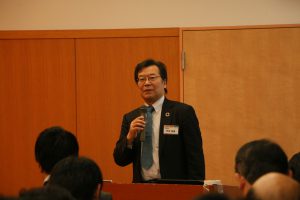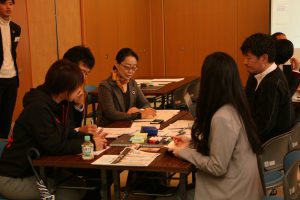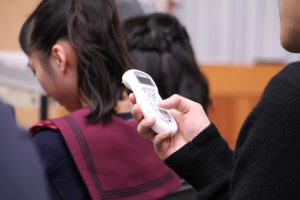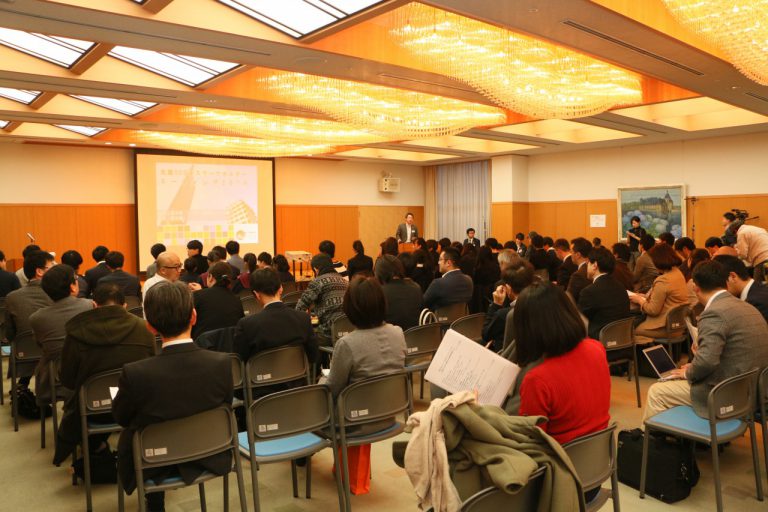On December 17th, the 2019 Hokuriku SDGs Stakeholder Meeting was held jointly with the Kanazawa Institute of Technology at the Kanazawa Theatre.
This meeting was held as a regional version of the Stakeholders Meeting for Revision of the SDGs Implementation Guidelines hosted at the United Nations University Headquarters on September 6, 2019. People from various parts of the Hokuriku region, including those from the private business sector, local governments, and citizens who had already been working on SDGs participated in this meeting and discussed the future of Hokuriku region and presented a sustainable plan for the future, looking forward to the next generation.

First, Mr. Kazuhiko Takemoto, a visiting professor at the United Nations University Institute for the Sustainability Advanced Studies, gave an opening speech. He talked about the importance of such a meeting being held in rural areas when the implementation guidelines for the SDGs are revised at the end of the year.
Next, Mr. Kentaro Endo, Counselor of the Cabinet Office Regional Revitalization Promotion Secretariat, gave a greeting and explained the nation’s policy towards achieving SDGs and regional revitalization.
In addition, Associate Prof. Shintaro Hiramoto, Director of the SDGs Promotion Centre at the Kanazawa Institute of Technology, shared information and explained the purpose of the meeting and how to proceed with the breakout sessions.
The meeting was divided into 5 subsequent sessions, and each group produced a specific plan for Hokuriku in 2030 in the form of a scenario.

① What does it mean to be a comfortable city for everyone to live in?
Why do people, money, things, and information gather in Tokyo? How can we apply the SDGs perspective to revitalize the region and change this trend?
Facilitator: Yuki Mishima (President of Fork and Landscape Designer) Tatsuya Kitagawa (Department of Information Management, Kanazawa Institute of Technology)
②Innovation: Production in the countryside and transmission to the world: What do we produce and transmit, and how do we gain the world’s understanding? Will the SDGs be its common language, and how will it co-exist with technology?
Facilitator: Hiromi Onuma (Representative of Hiro), Kenichiro Fukushima (Representative Director of Code for Kanazawa, Representative Director of Eye Publishing Inc.)
③ Education: Careers and learning in a 100-year lifetime society:
How do you enjoy and build a career over a lifetime of 100 years?
Facilitator: Naoki Miyatani (Start SDGs Operation Manager) Shoko Maruyama (Family Business Facilitator)
④Partnership: A mechanism to bring everyone’s power together in the community
-How can various actors co-create across sectors and organizations in order to achieve the SDGs?
Facilitator: Hirofumi Taniuchi (Kanazawa City Citizens’ Activities Support Center) Naoyuki Tsukamoto (Company Inc.)
⑤ Diversity: A society where diverse people can participate in decision making
How will our lives change if we can create a society where diverse people can participate in decision-making?
Facilitator: Kenji Kitamura (Coordinator of Social Division, Noto SDGs Laboratory) Sayaka Watanabe (Representative of re: terra)
During each session, members first looked over materials such as the NRI Future Chronological Table 2020-2100 and the Ministry of Internal Affairs and Communications’ TECH Strategy for the Future. They then drew up a vision of what work styles and lifestyles might be like in 2045. Next, members created a “persona,” a hypothetical person whose life they would simulate through an example scenario, including specific details of their life story and turning points.
After the afternoon breakout sessions, the scenarios were reported to the local students, the next generation who would hold the future of Hokuriku region. Many ideas were shared, such as the systems enabled by technological advances and changes in family structure.

Thank you to all of the participants who took their work seriously to the end. We also thank the students who participated in the sharing session in the end.




